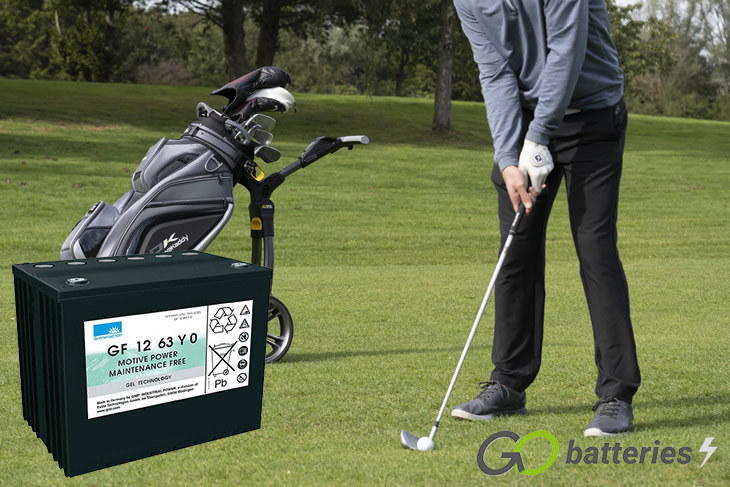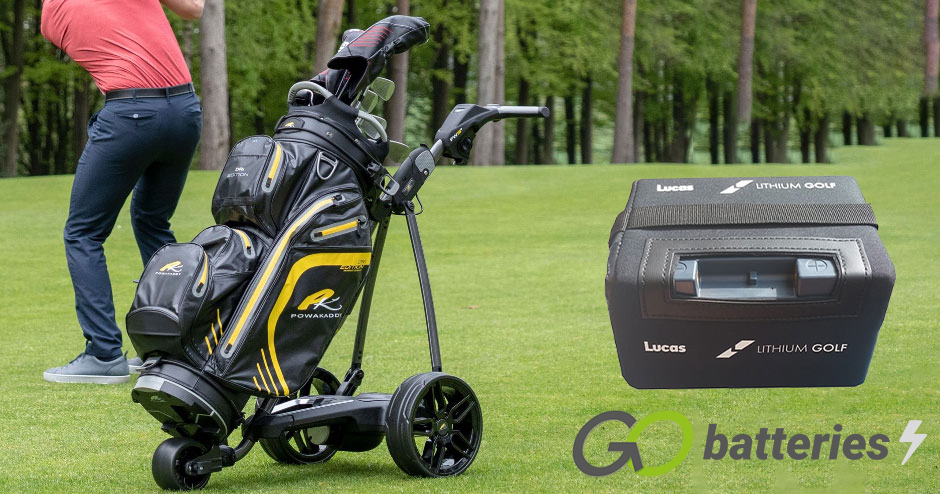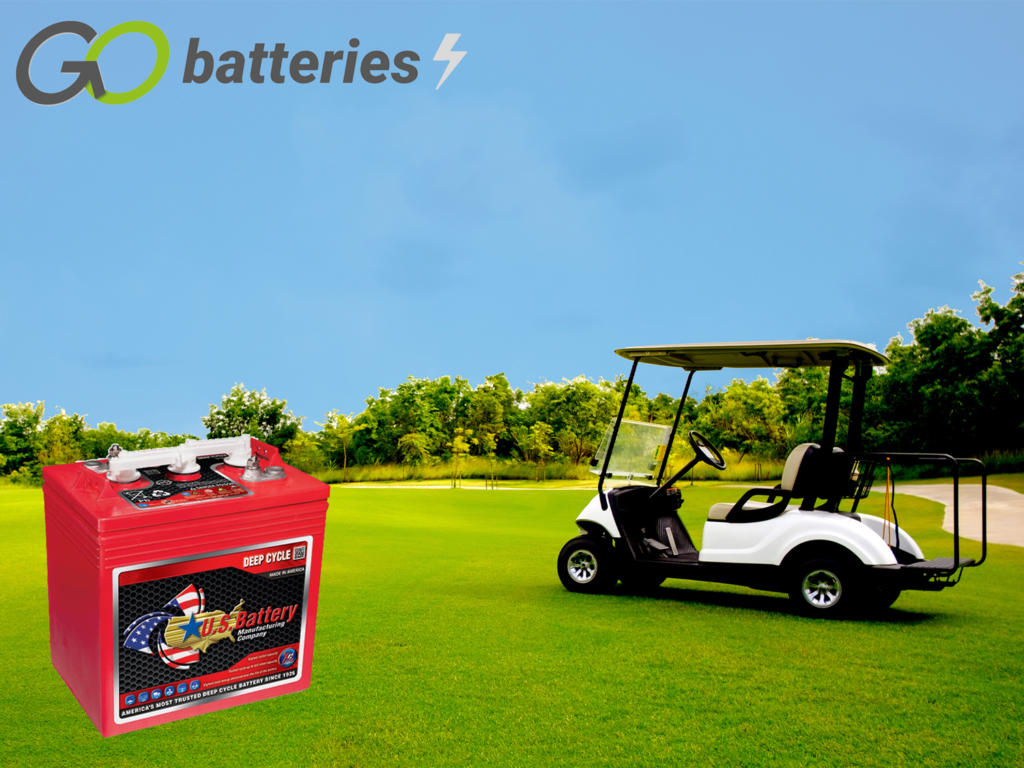
What is a Golf Battery?
Golf Trolley Batteries have traditionally been manufactured in predominantly sealed lead-acid (SLA) nowadays known better as AGM. The modern AGM Golf battery is robust, fully sealed and leak proof, but as a rule of thumb Gel batteries are ‘better’ quality than AGM and Lithium batteries are ‘better’ quality than Gel batteries. When looking at an increase in quality, as with most things in life, this makes them progressively more expensive. If you’re a regular keen golfer and the budget will allow then we would highly recommend a Lithium golf battery as an excellent choice, they are powerful, lightweight and the batteries will hold their charge for longer when not in use.
Golf Buggy Batteries have traditionally been deep cycle wet flooded batteries to cope with the demands placed on them, as the batteries are the heart of the golf buggies system, we recommend fitting the highest quality batteries that your budget will allow, thus getting the ultimate performance from your golf buggy over the longest period possible.
Golf Trolley Battery Technologies
The right care is essential to maximise the life of your Golf battery
Most traditional golf trolley batteries are AGM batteries, here we will explain the different battery technologies and help you decide which technology best suits your needs.
AGM Golf Batteries
AGM (Absorbent Glass Mat) batteries are an advanced lead-acid technology, with the electrolyte inside the battery absorbed in a specially designed fibreglass material that provides the power needed to keep you golfing. All of the batteries in this range are entirely maintenance-free, leak-proof and can be mounted in any orientation.
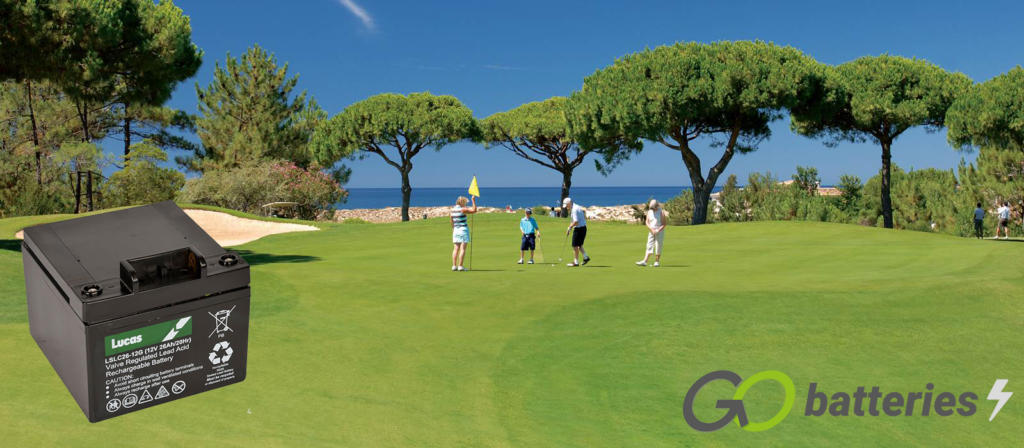
Gel Golf Batteries
Gel batteries are called Gel because they use silica (or sand) to turn the acid inside the battery into a thick liquid. This liquid does make it spill-proof, like our AGM batteries and offers deep cycles as well as being able to mount in any orientation.
Lithium Golf Batteries
Lithium batteries used in an electric golf trolley are LiFePO4 technology Lithium Ion Phosphate. They are used in many applications including Marine, Motorhomes and golf carts to name a few and are among the longest lasting batteries ever developed.
Lithium golf trolley batteries have a fast-charging rate and will hold there charge much longer than there lead-acid equivalent, when not in use. They have a built in battery management system and are very compact and light, typically smaller and a fraction of the weight of the lead-acid counterparts with a similar Ah rating.
Deep Cycle Golf Cart Batteries
On average, electric golf motors operate at 36 or 48 volts and draw between 50-70 amps of current while cruising at about 15 miles per hour. Keep in mind that the current draw during acceleration or while going up a hill is much higher. To keep you from getting stranded, golf cart batteries must supply a steady flow of high current for long periods.
Additionally, golf cart batteries will typically go through full charge and discharge cycles daily. Draining batteries below 50% is hard on them and often leads to a shortened lifespan and reduced performance.
Golf cart batteries are deep-cycle batteries designed and built with additional durability to sustain prolonged current draw and frequent deep discharging. They usually come in 6, 8, and 12-volt configurations that can be wired in series to provide the required voltage. For example, six 6-volt batteries connected in series would provide 36 volts, or four 12-volt batteries would provide 48 volts.
Lower voltage batteries typically have a higher amp-hour capacity. For example, if you wanted to provide 48 volts to your golf cart motor, eight 6-volt batteries would have more capacity and run longer than six 8-volt batteries. This is because you are using more batteries overall.
Relion – The Best Lithium Golf Cart Battery
Our InSight 48V Lithium battery was designed specifically to meet the power and energy needs in all types of golf carts, utility vehicles, AGVs and LSVs. Not only does it fit like a glove, but the one-of-a-kind battery management system hosts an intuitive software, providing Bullseye Balancing™ between batteries, seamlessly manages regenerative currents and avoids unnecessary disconnects. Quality from the inside out, the InSight Series is truly a Lithium battery in a class of its own.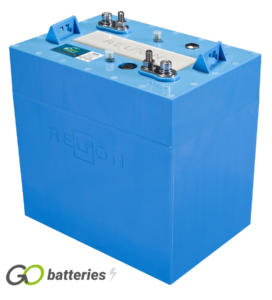
The golf cart market is evolving as more and more people are taking advantage of their versatile performance. For decades, deep-cycle flooded lead-acid batteries have been the most cost-effective means to power electric golf cars. With the rise of Lithium batteries in many high-power applications, many are now looking into the advantages of LiFePO4 batteries in their golf cart.
While any golf cart will help you get around the course or neighbourhood, you need to make sure it has enough power for the job. This is where Lithium golf cart batteries come into play. They’re challenging the lead-acid battery market due to the many benefits that make them easier to maintain and more cost-effective in the long run.
Below is our breakdown of the advantages of Lithium golf cart batteries over lead-acid counterparts.
Carrying Capacity
Equipping a Lithium battery into a golf cart enables the cart to significantly increase its weight-to-performance ratio. Lithium golf cart batteries are half the weight of a traditional lead-acid battery, which shaves off two-thirds of the battery weight a golf cart would normally operate with. The lighter weight means the golf cart can reach higher speeds with less effort and carry more weight without feeling sluggish to the occupants.
The weight-to-performance ratio difference lets the Lithium-powered cart carry an additional two average-sized adults and their equipment before reaching carrying capacity. Because Lithium batteries maintain the same voltage outputs regardless of the battery’s charge, the cart continues to perform after its lead-acid counterpart has fallen behind the pack. In comparison, lead-acid and Absorbent Glass Mat (AGM) batteries lose voltage output and performance after 70-75 percent of the rated battery capacity is used, which negatively affects carrying capacity and compounds the issue as the day wears on.
No Maintenance
One of the major benefits of Lithium batteries is that they require no golf cart battery maintenance whatsoever, whereas lead-acid batteries regularly need to be checked and maintained. This ultimately results in saved man-hours and the extra costs of maintenance tools and products. The lack of lead-acid means that chemical spills are avoided and the chance of downtime on your golf car is drastically reduced.
Battery Charging Speed
Regardless if you’re using a lead-acid battery or a Lithium battery, any electric car or golf cart faces the same flaw: they have to be charged. Charging takes time, and unless you happen to have a second cart at your disposal, that time can put you out of the game for a while. A good golf cart needs to maintain consistent power and speed on any course terrain. Lithium batteries can manage this without a problem, but a lead-acid battery will slow the cart down as its voltage dips. Plus after the charge has dissipated, it takes an average lead-acid battery roughly eight hours to recharge back to full. Whereas, Lithium batteries can be recharged up to 80 percent capacity in about an hour, and reach full charge in less than three hours.
Plus, partially-charged lead-acid batteries sustain sulphation damage, which results in significantly reduced life. On the other hand, Lithium batteries have no adverse reaction to being less than fully charged, so it’s okay to give the golf cart a pit-stop charge during lunch.
Eco Friendly
Lithium batteries put less strain on the environment. They take significantly less time to fully charge, resulting in using less energy. They do not contain hazardous material, whereas lead-acid batteries, as the name suggests, contain lead which is harmful to the environment.
Battery Cycle Life
How long do golf cart batteries last? Lithium batteries last significantly longer than lead-acid batteries because the Lithium chemistry increases the number of charge cycles. An average Lithium battery can cycle between 2,000 and 5,000 times; whereas, an average lead-acid battery can last roughly 500 to 1,000 cycles. Although Lithium batteries have a high upfront cost, compared to frequent lead-acid battery replacements, a Lithium battery pays for itself over its lifetime. Not only does the investment in a Lithium battery pay for itself over time, but big savings can be made in the way of reduced energy bills, maintenance costs, and possible repairs that would otherwise need to be made to heavy lead-acid golf cars. They also just perform better overall!
Are Lithium Golf Cart Batteries Compatible?
Golf carts designed for lead-acid batteries can see a significant performance boost with a Lithium battery conversion. However, this second wind can come at an installation cost. Many lead-acid equipped golf carts need a retro-fit kit to operate with a Lithium battery, and if the cart manufacturer doesn’t have a kit, then the cart will need modifications to operate with a Lithium battery.
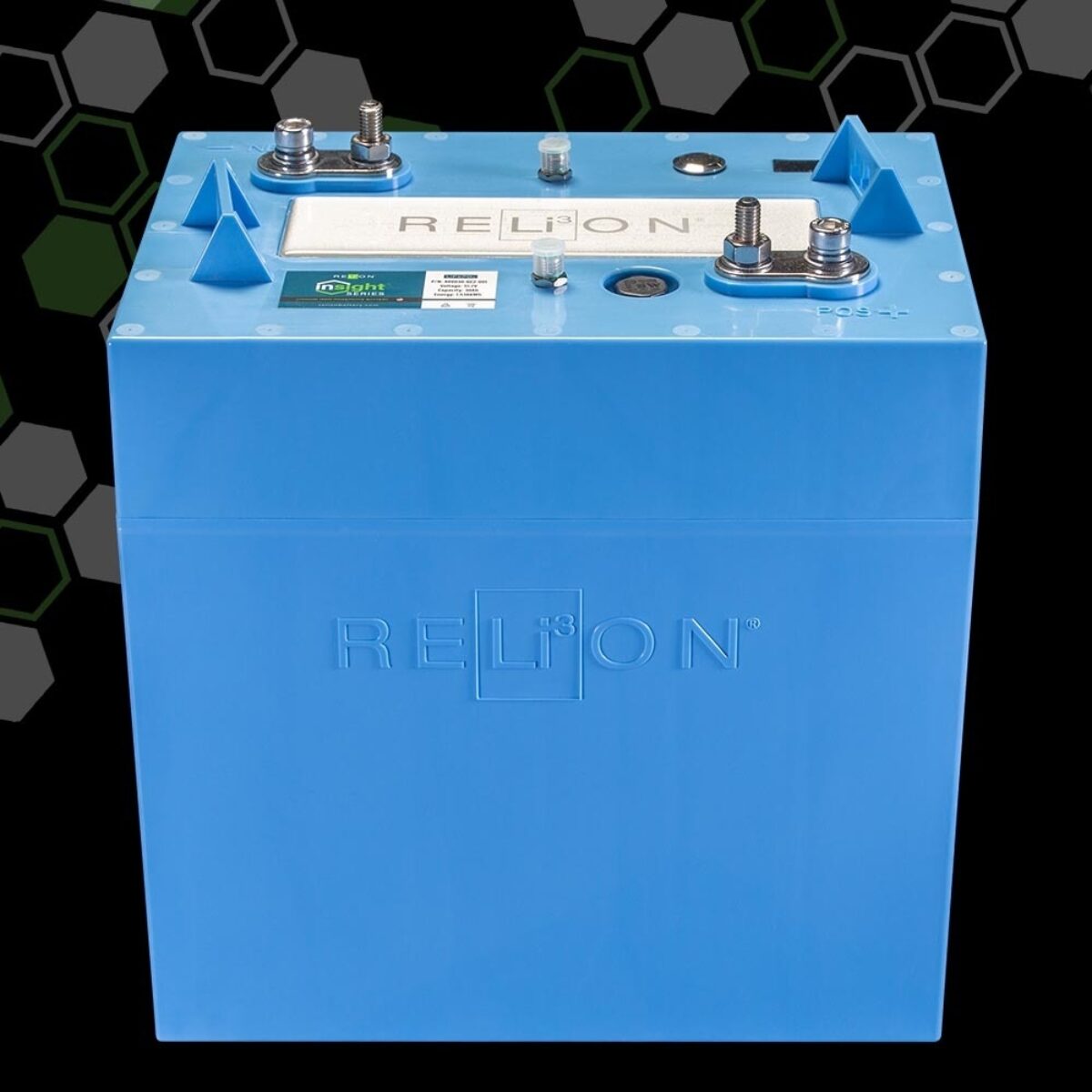
With RELiON’s InSight 48V 30A Golf Cart Battery, this isn’t a concern as they’re designed specifically to fit your golf cart. InSight batteries require no tray modifications, no retrofit kits, and no complicated connections, making installing Lithium batteries easier than ever before!
If you’re interested in switching your golf cart to a Lithium battery, consider buying our InSight 48V 30A Lithium battery. It’s the only Lithium golf cart battery designed specifically to meet the power and energy needs of all types of golf carts. It’s a drop-in ready replacement that is quality from the inside out. Designed to fit and engineered to perform, the InSight battery is the best Lithium option for golf carts today.
Charging your Golf Batteries
Once you’ve finished for the day you’re going to want to take the next step and make sure everything is ready to go the next time you’re on the green! One of the most important factors, is to remember to charge your golf batteries so everything runs smoothly on the fairways.



